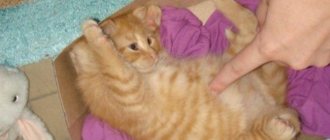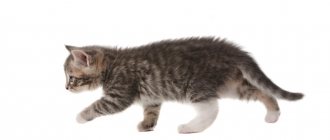And why don't kittens talk? Every pet owner has complained about this more than once, trying to understand why his pet meows, squeaks, complains, but there seems to be no reason for concern. Take, for example, going to the toilet: the tray is clean, the litter is fresh, but the kitten keeps walking around it in circles and does not dare to start important tasks.
The most important thing in such a situation is not to brush aside the problem, but to try to understand it. What if the little pet really needed help, and not only yours, but also a doctor’s?
What's normal and what's not?
If you have never had a cat in your apartment before, you need to know why kittens vocalize most often:
- weaned from their mother, they experience stress;
- animals want to eat, but don’t know where the food is;
- ready to play, so they do their best to attract attention.
Knowing about these cat habits, it is easy to project them onto the toilet situation. In the new walls, without a mother who took care of everything, including the hygiene of her baby, the kitten is lost. Even if he was already litter box trained, everything was different in the old house! Well, how can you not start meowing all over the apartment!
The owner is faced with a rather tricky task - to help the pet “remember everything” and convince him that the new tray is no worse than the old one. The situation is more difficult when the kitten has not yet acquired the necessary skills.
Its owner has to start training from scratch: watch with sympathy as the baby walks around the rooms and cries, clearly worried about where to relieve himself, and in the toilet, where he is dragged, cannot figure out that it is the tray that will give the long-awaited relief, and squeaks even more pitifully. However, no matter how difficult the lessons turn out to be, this is a normal process and there is no reason to worry.
Another fairly typical cause of concern may be the desire of the mustachioed-striped one to certainly attract the attention of his owners: he wants someone reliable to be nearby, if necessary, to help, to protect him from “external enemies” who strive to “offend the weak” in situations when he is particularly defenseless and not ready to escape.
Be careful: if the tone of the scream does not turn into a painful one (you will feel it), if the urine and more serious “gifts” are the same as usual, do not worry, but do not scold the baby, just try to assess the full strength of his fears - over time they will definitely pass, and the kitten will be able to do without a “support group”.
However, this is a purely individual question. Some kittens will prefer an intimate setting for toileting, while others will want to remain the center of attention. There are many cases when respectable cats, accustomed to independence from a young age, having matured, begin to attract the attention of people in precisely this way (in the absence of any physiological problems).
However, in order to be sure that your pet’s health is all right, you need to know some of the characteristics of the cat’s body and notice any deviation from the norm. Here are a couple of important points:
- if plant foods occupy a significant place in the diet, then the kitten often does “big things” than if it was fed mainly protein foods;
- Kittens walk “small” more often than older animals, since their bladder is very small.
The point, of course, is not to record on paper every visit of your pet to the toilet, but if you realize that he hasn’t been there for a long time, perhaps you will prevent the development of any gastrointestinal diseases in your baby and find a way to help to him.
Features of cat behavior
Taking care of quality food and the health of the cat is the main task of every owner.
When a small kitten or an adult cat appears in the house, the pet requires attention, care and care from its owner. It is very important that the owner can take care not only of shelter and regular food, but also of the full development and health of his pet. That is why it is necessary to closely monitor the behavior and condition of the cat in order to promptly detect symptoms of poor health and anxiety.
As for meowing during urination or defecation, this is considered a warning sign. What should you do if your cat starts meowing when visiting the litter box? What does the animal want to tell its owner? These issues need to be understood in order to avoid awkward and stupid situations.
What problems might there be?
Problems may be due to the fact that the cat litter you have equipped is not entirely satisfactory for the animal, and until you make the necessary changes, the kitten will pester you with its meows. What could your pet not like? First of all, the very place where the tray is located.
Find out where the cat's litter box was located at its previous owners, and, if possible, allocate a similar place for the baby. There may be complaints about both the tray (shape, the smell of new plastic or the detergent you use) and the filler if the kitten is used to something else.
Also, the kitten may not be satisfied with the speed with which you clean up his toilet: if he came to do business and found that his litter box had not yet been tidied up after the previous visit, he would probably start screaming throughout the entire apartment.
Animals meow in the toilet and because they experience pain. Very often this happens to kittens whose diet has changed dramatically - from mother's milk to more serious food. Fecal masses have become much denser, and this makes it more difficult to do “big things.”
Even if the baby does not feel pain, new sensations cause him anxiety - and the pet begins to loudly “complain about fate.” To prevent this from happening, the nutrition of the “transition period” must be very well thought out so that the body is not rebuilt in jerks, but smoothly, gradually .
In such situations, experts recommend giving animals more wet food and fermented milk products - kefir, yogurt, fermented baked milk. If you give your pet dry food, be sure to inquire about its composition and purchase those that contain prebiotics. In alarming cases, when the feces are very dense, and you see that the kitten is having great difficulty coping with them, purchase additional preparations with prebiotics from a veterinary pharmacy.
By the way, a kitten’s suffering can also be caused by the process opposite to constipation – diarrhea. If your kitten has worms, they can also bother him. The doctor will help solve both of these problems by recommending appropriate medications and treatment. As in cases with people, “self-medication” is contraindicated for small kittens.
Causes of pathology
When cleaning up the pet's potty, the owner may discover that there are several drops of blood on the feces, or that the entire mass of feces is colored reddish.
Let us note right away that this is not normal, and such a signal indicates that the animal needs increased observation and attention from humans.
If blood was detected in the stool of a furry pet once, the symptom did not recur again, and the general condition of the animal is assessed as good (that is, the pet is cheerful, cheerful, eats, actively responds to affection), there is no need to worry. Most likely, there was a one-time injury to the animal’s rectum (for example, the mucous membrane could have been scratched by a sharp piece of undigested food or a small foreign object that came out naturally).
If blood appears in the stool again and again, you need to find out the reason for its appearance immediately. In a situation where bloody spots in the animal’s feces are accompanied by such manifestations as lethargy or lethargy of the pet, diarrhea or constipation, refusal to eat, increased or decreased body temperature (the norm for an adult cat is within 38-39 degrees), you need to take the pet to the clinic immediately.
The determining factors due to which a cat goes “out of need” with blood for some time are mainly the following:
- intussusception;
- gastroenteritis;
- stomach ulcer;
- helminthic infestation;
- dysbiosis accompanied by constipation;
- vascular diseases;
- bacterial infection;
- injury to the anus or intestines;
- allergic reactions;
- blood clotting failure;
- foreign objects;
- severe intoxication (when chemicals enter the body);
- benign and malignant tumors.
Blood in your cat's stool is most often caused by irritation in the lower intestine. In addition to the symptoms of hematochezia, allergies and food intolerance can be caused in pets by ordinary food, most often dry food from a dubious manufacturer.
If your cat spends most of its life in the yard or on the street, then it may have been poisoned by rat poison, then bloody stools are a common occurrence. Also, if you notice very hard and extremely dry stools in your cat, then these are clear signs that the animal has nutritional problems.
Among other things, parasites, E. coli, bacteria, worms and other agents carrying viruses of various etiologies can also cause diseases accompanied by bloody feces. Therefore, always, as a caring owner, make sure that your beloved cat does not eat just anything, anywhere, but eats normally and drinks plenty of fluids.
Why does the cat run around the apartment like crazy?
This article provides information to give you an idea of what you're dealing with in typical pet situations. In any case, you need to contact a veterinarian, since it is impossible to make a diagnosis in absentia.
There may be several reasons for this strange behavior - a desire to go to the toilet, you gave cat food to eat, perhaps the pet wants to go for a walk. Try to observe the animal to draw certain conclusions.
If the whole point is a walk, then let him out during these hours; the food can be changed to regular food. Well, doing something with the toilet is not easy, because predicting when you want to visit the toilet is not always easy.
Cats, just like people, have their own attachments and needs, and it is not at all surprising that they strive to go where they grew up. Ask the new owners not to give them anything to eat. In your new home, protect your pet with your affection and care, so adaptation will be much easier for him.
This behavior can mainly be observed in those cats that do not walk outside much. Such a manifestation is a kind of natural instinct. The animal, in a way, models the situation that could have happened if it had been in the wild. The frequency of this behavior depends, first of all, on the cat’s temperament.
The hunting instinct influences the fact that at night cats are more sensitive: they pay attention to all sounds, creaks, and smells. This is especially true for young individuals. Since behavior is determined by nature itself, doing something will not be easy.
This cat behavior is not a cause for concern. The animal plays and trains. Thus, the hunting instinct is developed.
What did the cat do with the mice in his dream?
I dreamed of a cat catching mice - vr
This crazy behavior is quite understandable - physical activity is aimed at stimulating intestinal function,
Source
Why does a baby cry?
How much joy comes into the life of parents after the birth of a child. And how many new things are happening in their lives, getting used to each other, changing their routine, serving the little man. Even before his birth, the child chose his parents as his ideal helpers in the process of his growth and maturation in the earthly world.
Despite all the joys, it happens that a child cries. This is very worrying for young parents. What about him? I must be doing something wrong. Maybe he's sick? Maybe we're not taking good care of him?
Mothers experience a lot of anxiety in the first days and months of their baby’s life. So let's look at why a baby cries. How to learn to understand all the messages that a child conveys to his parents. If you learn to feel and understand what a child wants to say, then you can grow up almost without tears.
Any cry of a child signals a specific request. If you watch your baby, you will see that he does not start crying immediately, but only after some movements of his body, arms, legs or head.
The next step, he begins to make sounds, grunting and sniffling. Next, the baby begins to whine. And only after that he shouts invitingly and calls the adult, who was delayed somewhere and did not see the signs that the baby was giving.
No need to wait for crying, always watch your baby. Crying is the final chord in the process of calling parents.
The most common reason why a baby calls his parents in the first days and months of life is that he wants to be close to his mother! He's calling MOM! The child needs her presence nearby, he wants to breathe her smell, hear her voice, feel the warmth from his mother’s body, feel her native energy.
It is the mother’s constant presence that the newborn needs. The manual period continues for another year after birth
Source
Attracts attention
Cats are social animals. They need enough human interaction. Having run around, the cat will calm down and go to rest in its favorite place. Nowadays, it is rare for people to have several pets at once, so you should devote enough time to your only furry pet. Moreover, he himself will let you know when he loses interest in communicating with the owner.
Relief
Any animal experiences a kind of satisfaction when it gets rid of waste, which includes not only unnecessary, but often also harmful substances to the body. Of course, this is a reason for joy, and in the most literal sense. According to research, after cleansing the intestines and bladder of waste, a corresponding signal is sent to the brain, which stimulates the production of certain substances, popularly called the hormone of happiness.
It turns out that the cat is “jumping for joy” having gotten rid of an unnecessary “burden.” This version is quite plausible, since something like relief (it’s not for nothing that this condition is called relief) is experienced by people after visiting the toilet, and not only cat owners.
They have their own territory
Cats are animals with character and their own personal lives. Owners need to understand that their pet has many interests that are not limited to the territory of the apartment. Outside the home, they communicate with their relatives, get food, and hunt birds and rodents. If a sexually mature cat leaves the house, the reason may be that a female in heat has appeared nearby. Woolen robbers themselves determine the territory of their possessions and jealously control it. With a competent approach, the owner can artificially limit the sphere of interests of his pet so that he does not try to run away from home.
why does the cat meow in front of the toilet?
ZooForum: Kitten meows before going to the toilet - ZooForum
(others can give advice in a PM, indicating that the advice is not given by a veterinarian. But the forum is not responsible for THESE advice.)
Our cat is 5-6 years old. He is neutered and when he goes to the toilet he always screams (before). It’s been like this for three years now, but there seems to be no blood or pain. Only when you feed him raw fish or if you give him a little more than normal, he vomits. We tried to give it boiled food in smaller portions, but sometimes it still happens. How to feed him?
The cat is 11 years old, she was diagnosed with a brain tumor, can she be dewormed? We give her prednisone tablets. And she also reacts to changes in the weather, is it possible to help her somehow?
Answer:
Why do you think that there is no pain if the cat screams? If I were you, I would get the cat's urine tested. But some cats may call their owners to be praised - “What a great guy - he’s doing everything right!”
Your cat may have a narrowing of the esophagus. Possibly problems with the pancreas, worms, fur in the stomach. There are many reasons for vomiting. I would often feed a little at a time and try to figure out which foods cause vomiting (I would exclude them). I would give him a course of enzyme (mezim, for example), drive away worms, and give him pills to remove hair from the stomach. And if all this doesn’t help, I would contact a veterinarian.
All cats (even if they do not leave the house at all) are recommended to have a comprehensive vaccination (5 or 7 diseases, depending on the type of vaccine, plus vaccination against rabies and trichophytosis-microsporia (lichen) Vaccinated once a year, there is no interval between different vaccines less than a month.Before vaccination, it is necessary to get rid of worms and the cat must be absolutely healthy.
It is possible to deworm a cat with a brain tumor. But it seems to me better to use p
Source
Onset of puberty
Different breeds of domestic cats reach puberty at different times. Most young individuals are ready for intercourse by 6-7 months. In some breeds, such as Maine Coons, it may begin at this age, but last slightly longer, up to about 15 months.
The play of hormones, the powerful instinct of procreation felt by a young animal, makes it restless. It will scream loudly at any time of the day, roll on the floor, and demand to be let out into the street.
The owner of a domestic cat should immediately decide on a solution to this problem. There are actually two of them: castration (sterilization) or providing the opportunity for the realization of instinct. In all other cases, the animal will experience real agony during periods of sexual heat. There is no need to be afraid to sterilize an animal if the owner’s plans do not include breeding cats. Veterinarians believe that this simple procedure not only does not cause harm, much less moral suffering, to the animal (they simply have no morals), but even prolongs life and preserves health.











